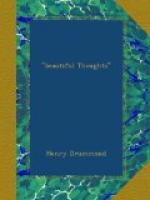November 16th. Few men know how to live. We grow up at random, carrying into mature life the merely animal methods and motives which we had as little children. And it does not occur to us that all this must be changed; that much of it must be reversed; that life is the finest of the Fine Arts; that it has to be learned with life-long patience, and that the years of our pilgrimage are all too short to master it triumphantly. Pax Vobiscum, p. 31.
November 17th. Christ’s life outwardly was one of the most troubled lives that was ever lived: Tempest and tumult, tumult and tempest, the waves breaking over it all the time till the worn body was laid in the grave. But the inner life was a sea of glass. The great calm was always there. At any moment you might have gone to Him and found Rest. Pax Vobiscum, p. 35.
November 18th. The creation of a new heart, the renewing of a right spirit is an omnipotent work of God. Leave it to the Creator. “He which hath begun a good work in you will perfect it unto that day.” The Changed Life, p. 57.
November 19th. To become like Christ is the only thing in the world worth caring for, the thing before which every ambition of man is folly, and all lower achievement vain. Those only who make this quest the supreme desire and passion of their lives can even begin to hope to reach it. The Changed Life, p. 57.
November 20th. A religion of effortless adoration may be a religion for an angel but never for a man. Not in the contemplative, but in the active, lies true hope; not in rapture, but in reality, lies true life; not in the realm of ideals, but among tangible things, is man’s sanctification wrought. The Changed Life, p. 58.
November 21st. Nothing ever for a moment broke the serenity of Christ’s life on earth. Misfortune could not reach Him; He had no fortune. Food, raiment, money—fountain-heads of half the world’s weariness—He simply did not care for; they played no part in His life; He “took no thought” for them. It was impossible to affect Him by lowering His reputation; He had already made Himself of no reputation. He was dumb before insult. When He was reviled, He reviled not again. In fact, there was nothing that the world could do to Him that could ruffle the surface of His spirit. Pax Vobiscum, p. 36.
November 22d. Life is the cradle of eternity. As the man is to the animal in the slowness of his evolution, so is the spiritual man to the natural man. Foundations which have to bear the weight of an eternal life must be surely laid. Character is to wear forever; who will wonder or grudge that it cannot be developed in a day? The Changed Life, p. 55.
November 23d. To await the growing of a soul is an almost Divine act of faith. How pardonable, surely, the impatience of deformity with itself, of a consciously despicable character standing before Christ, wondering, yearning, hungering to be like that? Yet must one trust the process fearlessly, and without misgiving. “The Lord the Spirit” will do His part. The tempting expedient is, in haste for abrupt or visible progress, to try some method less spiritual, or to defeat the end by watching for effects instead of keeping the eye on the Cause. The Changed Life, p. 56.




